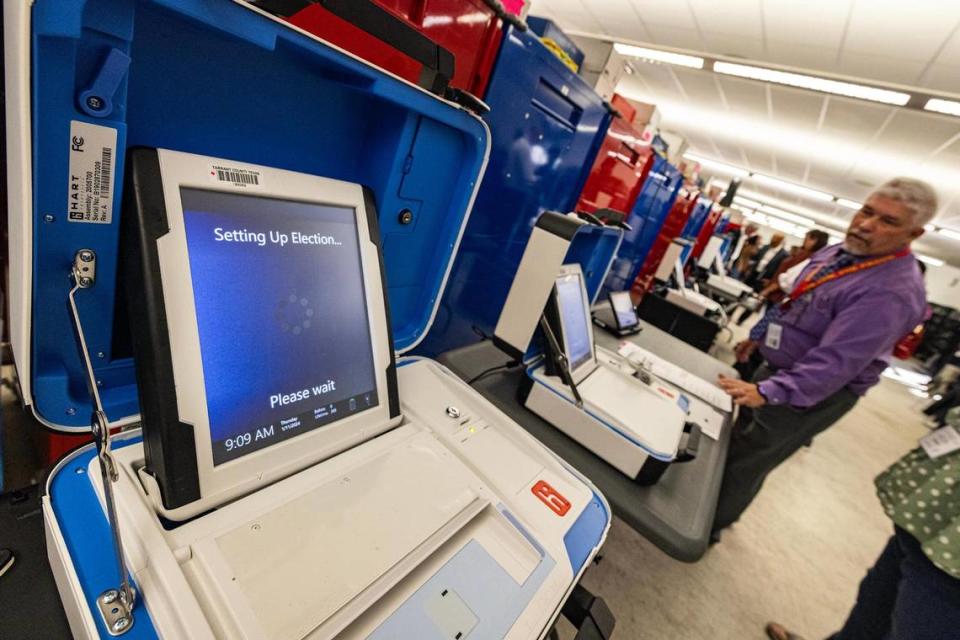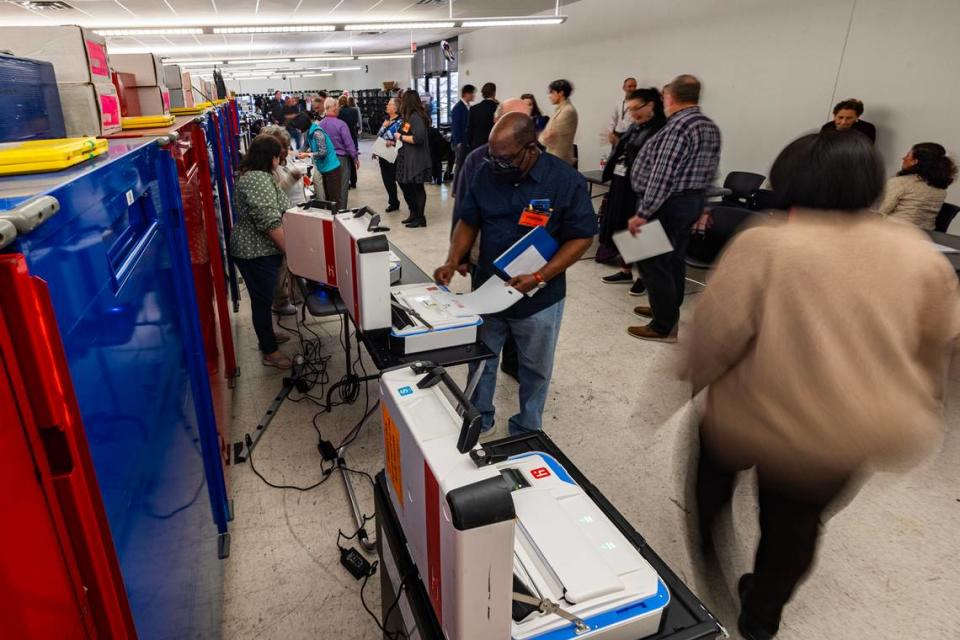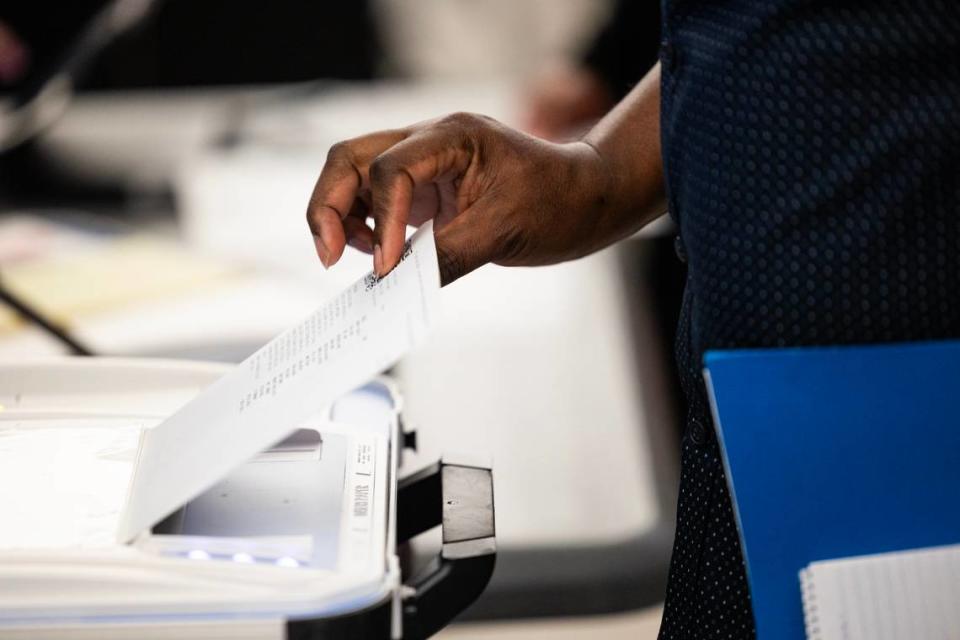What to know about March 5 Republican, Democratic primaries in Texas, Tarrant County
The presidential race is at the top of the ticket, but voters in North Texas will also decide who they want on the November ballot in important local races when they head to the polls in the coming weeks.
Congressional, state and county-level races are on the March 5 Democratic and Republican primary ballots. Several races will be all but decided after results are tallied.
Voters head to the polls starting on Feb. 20, with early voting running through March 1.
Here’s what to know as you prepare to vote.
Super Tuesday in Texas
Texas has the second most delegate votes, 40, behind California’s 54 votes. Both states have their primaries on March 5, known as Super Tuesday.
It seems that all eyes should be on Texas as vote tallies trickle in on election night. But unlike in some years past, the nominees for president may be all but locked in by the time Super Tuesday arrives.
“It’s the biggest day,” said Mark Jones, a Rice University political science professor. “By the same token, it’s going to be more of an afterthought.”
Biden has no major opponents on the Democratic side.
Former President Donald Trump and former South Carolina Gov. and U.N. Ambassador Nikki Haley are the main contenders in the Republican primary, but Trump is the front-runner.
While Haley could continue the remainder of her campaign as the last alternative to Trump, there is a high chance she suspends her campaign before March 5, Jones said, citing polling that puts Trump ahead in South Carolina’s Feb. 24 Republican primary, Haley’s home state.
Races to watch in North Texas
So who else is on the ballot? Full sample ballots Tarrant County residents can be found on county’s election department website, but here are some races to watch.
Texas U.S. Senate
Candidates in the Democratic primary for U.S. Senate are vying for a place on the November ballot in hopes of unseating U.S. Sen. Ted Cruz. (Cruz himself, has drawn two primary candidates, but is favored to win the Republican primary.)
Front-runners on the Democratic side include U.S. Rep. Colin Allred of Dallas and state Sen. Roland Gutierrez of San Antonio. They are among nine Democratic candidates running for the seat. If a single candidate doesn’t get more than half of the votes, the race will go into a runoff.
The last time Cruz was on the ballot, in 2018, he narrowly lost to El Paso Democrat Beto O’Rourke. Recent polling has Cruz ahead of both Allred and Gutierrez in a head-to-head contest, according to FiveThirtyEight.
But Texas Democratic Party Chair Gilberto Hinojosa predicts that either candidate could beat Cruz in November. Cruz is “deeply unpopular” and people are tired of divisive politics, he said.
“Both of these guys, Congressman Allred and Sen. Gutierrez, have been out there fighting for the people in the state of Texas for a long time, and I think that they are someone that people can turn to and say, ‘This guy is going to be a good United States senator for all of us,’” Hinojosa said.
Thus far, Allred has out-raised all of his Democratic opponents, reporting more than $18.4 million and spending $8.3 million this campaign cycle, according to the Federal Election Commission. Next behind him is Gutierrez, raising $1.1 million and spending about $751,200.
During the latest filing period covering Oct. 1 to Dec. 31, Cruz reported raising $3.4 million, less than Allred’s $4.8 million and more than Gutierrez’s roughly $433,400, FEC records show.
The primary has been heated on the issue of immigration. Gutierrez has slammed Allred for signing a U.S. House resolution denouncing the Biden administration’s “open-borders policies.” He was among 14 Democrats who signed the measure, which was supported by 211 Republicans. Nine Republicans and 12 Democrats didn’t vote.
In an interview with the Star-Telegram’s editorial board, Gutierrez criticized the resolution, saying it reads like “some ridiculous Fox News narrative.”
“When you accept their premise, it keeps us from doing the things that we really need to be talking about,” Gutierrez said. “The things that they’ve broken on education, on health care, on gun violence, on women’s reproductive rights.”
Allred defended his vote. As a member of the minority party, Democrats didn’t have input on language used, Allred said. While he doesn’t agree with some of the terms and thinks there are some inaccuracies, he also doesn’t think the Biden administration has done enough on the border, he said.
“I have communicated that as a White House, that I thought we should have been much more forward facing in terms of addressing what has been a crisis for some time at the border,” Allred said. “And what I think we’re seeing now is that the president and the White House are moving in the direction that I would like us to see faster and sooner, so that it didn’t get stuck in some of the election year politics that it now appears to be stuck in.”
Open Congressional seats
Tarrant County will be getting two new representatives in the U.S. House. Reps. Kay Granger, a Fort Worth Republican, and Michael Burgess, a Lewisville Republican, are not seeking reelection after years in Congress.
Granger, who has represented Congressional District 12 for nearly three decades, has risen to the powerful role of appropriations chairwomen during her tenure. The race to replace her has drawn a pool of five Republicans and two Democrats. Running in the Republican primary is Clint Dorris, Shellie Gardner, Craig Goldman, Anne Henley and John O’Shea. Sebastian Gehrig and Trey Hunt are running in the Democratic primary.
Goldman, a current state representative, leads in fundraising, with $1.1 million raised this cycle, according to the FEC. Next behind him are O’Shea with roughly $237,700 and Gardner with about $155,500.
In the Democratic primary, Hunt reports raising about $4,800. FEC records do not show earnings for Gehrig. According to a document filed with the commission, he had raised less than $5,000 as of Dec. 31.
Burgess’ Congressional District seat, Congressional District 26, has drawn a crowded field of Republican candidates that include Scott Armey, Neena Biswas, Vlad De Franceschi, Brandon Gill, John Huffman, Luisa Del Rosal, Jason Kergosien, Joel A. Krause, Doug Robison, Mark”Big Rut” Rutledge and Burt Thakur. Ernest R. Lineberger III is the only Democrat running for the district.
Gill has raised the most, reporting about $478,700 this campaign cycle, according to the FEC. Closest behind him is Huffman with roughly $303,100 and Del Rosal with $189,200.
Given the number of candidates on the Republican side, both congressional races could go into a runoff.
Races in the Texas Legislature
Races in the Texas Legislature for districts just north of Fort Worth are getting attention.
Rep. Lynn Stucky, a Denton Republican, has drawn two primary challengers: Elaine Hays and Andy Hopper.
Rep. Drew Springer, a Muenster Republican, isn’t seeking reelection. Republicans Cody Clark, Carrie de Moor, Brent Hagenbuch and Jace Yarbrough are seeking the open seat — a race that has been marked by residency challenges in court. Michael Braxton, Matthew McGhee and Dale Frey are running in the Democratic primary.
Another open race is House District 97, where incumbent Rep. Goldman isn’t seeking reelection as he runs for Congress. Three Democrats and three Republicans are running. Diane Symons, Carlos Walker and William W. Thorburn are running as Democrats. Cheryl Bean, Leslie Robnett and John McQueeney are running as Republicans.
Overall, top issues in state legislative races this cycle include the border, Attorney General Ken Paxton’s impeachment and vouchers, as Gov. Greg Abbott continues his push for education savings accounts. The program would let parents use state dollars for their child’s private education.
Paxton and Abbott have been backing candidates as political retribution, even if it means supporting Republican incumbents serving in the Legislature.
But the border is what seems resonates most with voters among the three issues, according to a recent poll from The University of Houston and Jones.
The poll found that 86% of likely Republican voters are more likely to vote for a House incumbent who voted to make illegal immigration a state crime.
Comparatively, 60% of Republican primary voters surveyed said they’re less likely to vote for a candidate who opposed school choice/voucher legislation and 46% said they’re less likely to vote for a candidate who voted for the articles of impeachment against Paxton.
The governor has made the border a central talking point at recent campaign events for state House candidates in North Texas, as he continues to clash with Biden and the federal government over immigration and border security.
Tarrant County primary races
Contested races on the ballot for Tarrant County leadership include the positions of tax assessor-collector and county commissioner for Precinct 1.
Former Tarrant County Republican Party Chair Rick Barnes is challenging incumbent Wendy Burgess for tax assessor-collector. The position oversees every-day issues like property taxes, vehicle registrations and alcoholic beverage permits.
Burgess, in her Star-Telegram candidate questionnaire, said she’s running because she’s “the subject matter expert in this race.”
“I have dedicated the past five years to learning every aspect of the operations, staff, processes, tax law, and TxDMV requirements,” Burgess said. “I have also been dedicated to understanding the wants and needs of the taxpayers and customers in our office.”
Barnes said he’s a lifelong conservative, businessman and proven leader who wants to “restore integrity, fairness, accountability and transparency to the Tarrant County Tax Assessor-Collector’s Office.”
Small Business Owner KC Chowdhury is the only candidate running in the Democratic primary.
Four Democrats are running to represent Precinct 1 on the county’s commissioner court, the governing body for Tarrant County: Darryl Brewer, the owner of The Brewer Group; Roderick Miles Jr, who works as chief of staff for commissioner Roy Brooks; nonprofit director Kathleen Hick and Mia Hall, a public school executive.
Incumbent Roy Charles Brooks isn’t seeking reelection.
Small Business Owner Michael Barber is running as a Republican.
Candidates in the Democratic primary identified infrastructure, public health, property taxes, affordable housing, public safety and jail deaths and conditions as some of the top issues in the race in their candidate questionnaires.
Check if you’re registered
Voters can check if they’re registered to vote on the Texas Secretary of State website.
The deadline to register for the March 5 primaries was Feb. 5.
In Texas, primary voters do not have to register with a certain political party to vote in the primaries. But if a race goes into a runoff, voters who voted in the first round must cast ballots in the same party primary as they did for the March election.
Where to vote
Tarrant County voters can vote at any polling place in the county during the early voting period and on Election Day. A list of polling places is available on the Tarrant County Election Department’s website.
What to bring (and not bring) to the polls
Voters should bring photo identification to the polling place. Eligible ID forms are:
A Texas driver’s license
A Texas election identification certificate
A Texas personal identification card
A Handgun license
A U.S. military ID card with your photo on it
A U.S. citizen certificate with your photo on it
U.S. passport
Voters who do not have a photo ID and cannot reasonably obtain one can fill out a Reasonable Impediment Declaration and provide a supporting form of ID (copy or original). Supporting documents could be:
A government document with your name and address, including a voter registration certificate.
A current utility bill
A bank statement
A government check
A Paycheck
A Birth certificate
There are a number of things voters should not bring to the polls. They include:
Cell phones, cameras and other electronics: Voters can’t use cell phones, tablets, laptops within 100 feet of a polling place. Cameras and the recording of video and sound also aren’t allowed.
Campaign clothes: Voters cannot wear campaign and political party apparel that is related to a ballot measure.
Firearms: Voters cannot bring guns to polling places.
How to vote by mail
Voters who want to cast their ballots by mail should make sure their application, available in English, Spanish and Vietnamese on the county’s election website, has been received by Feb. 23.
The following voters are eligible:
Voters who are 65 or older on Election Day (March 5)
Voters who are sick or disabled
Voters expected to give birth three weeks before or after Election Day
Voters who are not in the county where they’re registered during early voting and on Election Day.
Voters who are civilly committed
Voters who are in jail, but otherwise eligible to vote
Applications can be hand delivered to the county’s Early Voting Clerk or sent to:
Mailing Address: Tarrant County Elections, PO Box 961011, Fort Worth, Texas 76161-0011
Express Courier Delivery: Tarrant County Elections, 2700 Premier St., Fort Worth, Texas 76111-3011
Fax: 817-850-2344
Emailed and faxed applications must also be sent via mail.
It’s recommended that voters who don’t know whether their Texas Drivers License/ID number or the last four digits of their social security number was used on their registration record provide both numbers on their application.
Completed ballots should be sent to:
Early Voting Clerk, Tarrant County Elections Administration, PO Box 961011, Fort Worth, TX 76161-0011
They can be delivered in person to:
2700 Premier St., Fort Worth, TX 76111
Ballots can be tracked on the Texas Secretary of State website.
Accommodations for voters
Voters with disabilities are legally entitled to equal voting access.
Tarrant County offers the HART InterCivic Verity Touch Writer Duo Voting System for those who are blind, have limited vision or who have limited dexterity and need assistance to vote. Those with limited mobility that “substantially impairs the person’s ability to move around” can ask for priority voting and be moved to the front of the line, according to the election office.
Voters who have a hard time walking or standing for long periods of time can vote curbside.
Voters with disabilities and voters who do not speak English can get assistance at the polls. The person helping them cannot be their employer, agent of their employer or an officer or agent of their union, according to VoteTexas.gov. The assistant must take an oath that they will not influence voters and will mark the ballot as the voter directed.
When’s the runoff for Texas’ 2024 primaries?
The runoff for the March Democratic and Republican primaries is scheduled for May 28. Early voting starts May 20 and runs through May 24.
Useful contacts and websites
Voters in Tarrant County needing more information about the voting process should reach out to the county’s election department or the Texas Secretary of State. Voters outside of Tarrant County can also reach out to their local election officials.
Tarrant County Election Office
Phone: 817-831-8683
Vote by mail: votebymail@tarrantcountytx.gov
Register to vote: voterregistration@tarrantcountytx.gov
Texas Secretary of State’s Office
Phone: 800-252-8683
E-mail: elections@sos.texas.gov





